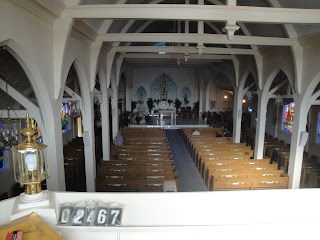I went to morning Mass here on Thursday with a friend. The parish is extremely Portuguese - it's named after St. Elizabeth of Portugal (more on her below), not the "Blessed is the fruit of thy womb" St. Elizabeth. Furthermore, I learned from the priest that it's Azore Portuguese, not mainland Portuguese, and that apparently there's a world of difference between the two. I'm glad I found this out before committing some sort of Portugal faux-pas and getting someone mad at me.
 |
| The parish center |
 |
| What's going on on these doors? I meant to look at them more closely on the way out, but I totally forgot. |
The Mass was bilingual, which certainly isn't the first time that's happened. I'd set the over/under on number of Portuguese Masses I accidentally go to on this tour at 5 1/2. The Mass was very well attended, which is definitely a pattern I've noticed in Portuguese parishes; these people are extremely faithful to their churches. The first reading was incredibly long and in Portuguese, but at least the Gospel was in English. I'm pretty sure the psalm was also in English, but I couldn't understand anything the lector was saying.
 |
| Awesome picture to have behind the baptismal font. |
 |
| Sorry Jesus, but you scared the heck out of me when I first saw this. |
The predominant color inside the church is white. While the interior isn't particularly fancy, you can see signs that the parish is doing fine financially - specifically, air conditioning and a nice sound system. The most beautiful part of the church is ten enormous stained glass windows of different saints, all paid for by a particular family in the parish. There's also a dove above the altar, a detail that I think is found in a lot of churches, but that I regularly don't notice. I love the visual of the dove sitting up there during the Mass, especially during the Liturgy of the Eucharist.
St. Elizabeth of Portugal is also known as St. Elizabeth of Aragon. She was a queen of Portugal in the 13th and 14th centuries. Several other members of her extended family are also saints. Throughout her life she was known for her great religious devotion, to the point of eliciting jealousy from others. She said the full Divine Office every day. fasted, cared for the poor, and went to Mass twice a day. She also served as a peacemaker in the political strife of her day, once sitting on a mule in between two armies to prevent them from fighting each other. When her husband died she became a cloistered nun and a third order Franciscan.








No comments:
Post a Comment